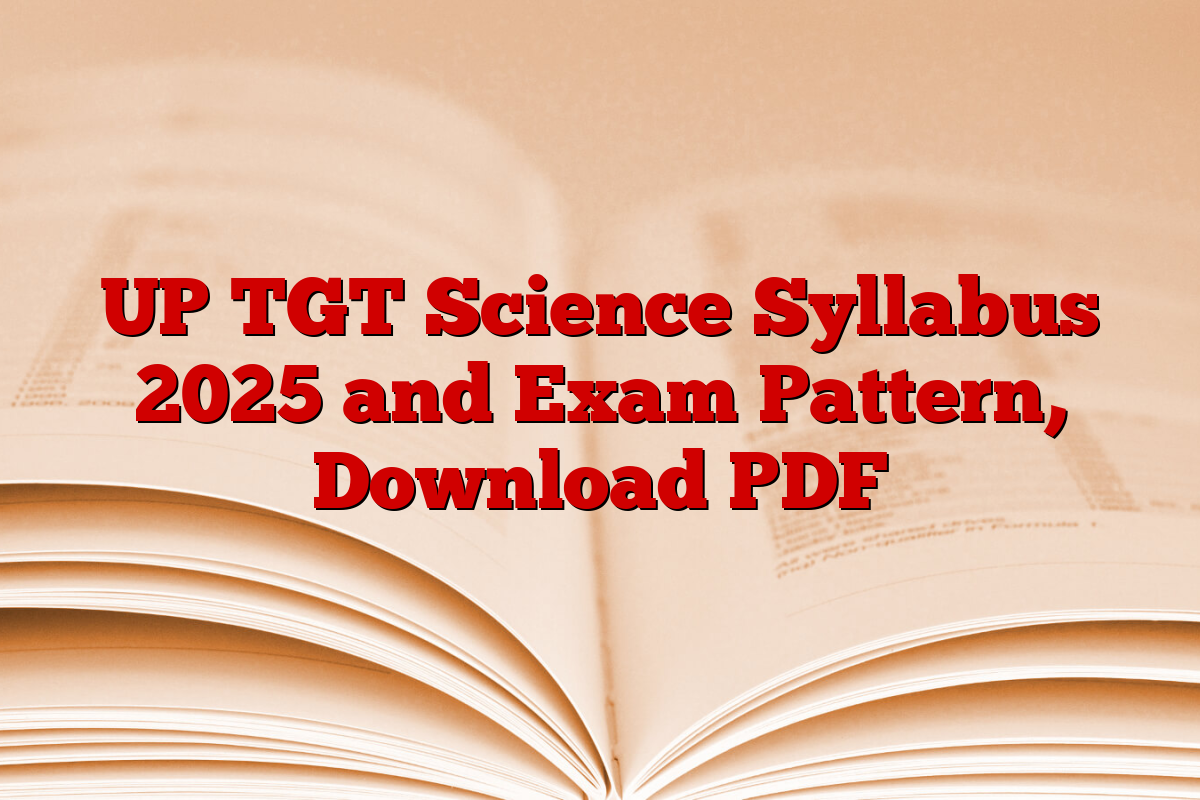After a long wait, the Uttar Pradesh Secondary Education Services Selection Board (UPSESSB) has officially announced the UP TGT exam, which has increased relief and enthusiasm to the candidates. For effective preparation, a purpose of securing the status of trained graduate teachers (TGT) in Science should be focused on mastery in the UP TGT science courses and examination patterns. This article offers a comprehensive observation of courses, detailed examination patterns, marking scheme and major examination insights to help candidates to strategically plan and promote the possibility of success.
UP TGT Science Syllabus 2025
UP TGT Science Syllabus is structured to assess the subject matter expertise, scientific qualifications and problems of candidates required to teach science at secondary level at secondary level. It includes major topics like Physics, Chemistry, Biology and Environmental Sciences. A concrete understanding of these main areas is necessary for candidates to perform well in the exam and secure a position as a science TGT teacher under UPSESSB.
UP TGT Science Syllabus 2025: Fraudline
UP TGT Science Examination assesses the scientific knowledge, analytical skills and ideological clarity of the candidates. The examination follows a structured pattern, which ensures a comprehensive evaluation of the subject expertise of the applicants.
| UP TGT Science Syllabus 2025 | |
| Recruitment name | TGT PGT Teacher Vacancy |
| Name of origin | Uttar Pradesh Secondary Education Service Selection Board |
| Advertisement No. | Novav 01/2022 |
| Selection process | Written test, interview |
| Section | TGT Science Syllabus |
| TGT vacancy number | 3539 |
| Course section | Physics, Chemistry, Biology and Environmental Sciences |
| Exam date for TGT | 14-15 May 2025 |
TGT Science Exam Pattern
The purpose of UP TGT Science Exam 2025 is to assess the scientific knowledge, analytical thinking and ideological clarity of the candidates through a well -structured format. The examination consists of 125 multiple choice questions (MCQ), each of which has 4 marks, a total of 500 marks. With the 2 -hour period and no negative marking, the candidates have the opportunity to try all the questions confidently without fear of punishment, which increases their chances of high scoring.
| TGT Science Exam Pattern | |||||
| Examination plan | Total Questions | Per question mark | total marks | exam period | Answer option per question |
| 125 mcqs | 4 digit | 500 points | 2 hours | 4 options (only 1 correct) | |
| Question type | Multiple choice question (mcq) | ||||
| marking scheme | No negative marking | ||||
| Compulsory question | All questions are mandatory | ||||
| Focus area | Physics, Chemistry, Biology, Environmental Sciences | ||||
TGT Science Detailed Courses 2025
The UP TGT science course includes secondary and advanced scientific concepts which are required for teaching at secondary level. Candidates should focus on theoretical understanding, practical applications and problem-solving techniques. Below is a wide breakdown of the course:
| TGT Science Detailed Courses 2025 | |
| Subject area | Topics covered |
| Physics | Dimensions and Measurement: Verification of equations through fundamental volume, derivative volume, unit conversion, dimensional methods, scalar and vector volume. |
| Mechanics: The rules of Newton’s proposal, relative speed, displacement, velocity, acceleration, speed, energy conservation, kinetic and possible energy, angular speed, gravity force, migration velocity, rotational speed and simple harmonic motion. | |
| Heat: The concept of heat and temperature, conduction, convection, radiation, steepon law, specific heat capacity, calorimatry, thermodynamics (first law) and the concept of state changes. | |
| Optics: Mirror and lens, refraction, diffraction, intervention, polarization, human eye. | |
| Electricity and magnetism: Electric cell, law, chain and parallel resistance, electromotive force, magnetic field and AC/DC circuit. | |
| Modern Physics: Atomic structure, the principle of bohar, atomic fragmentation and fusion, photoelectric effect, PN junction. | |
| chemistry | Case: Substances, elements (metal and non-metal), compounds, and types of mixture. Laws of chemical combination, atomic theory of Dalton. |
| Atomic structure: The discovery of alpha shatter, atomic models (Rutherford, Bohar) of electron, proton, neutron, Rutherford. Quantum number, Hygenberg uncertainty theory. | |
| chemical bonding: Ionic, covalent, and polar bonds, exceptions to the octate rule, hybridization, size of SP2, SP3 orbitals. | |
| chemical reactions: Types of reactions (displacement, joint, combustion, etc.), electrical chemical cells, nernat equations, oxidation-least. | |
| periodic table: The periodic law of Mendleev, periodic trends, general properties of S and P block elements, transition elements. | |
| organic Chemistry: Functional group, isomerism, types of organic reactions (replacement, addition, elimination). Preparation and properties of alkenes, alkynes, alcohol, acid, and their derivatives. | |
| biology |
cell Biology: The structure and function of cells, organels, cell divisions (mitosis and semi -division), and cellular respiration. |
| human physiology: Communication, digestion, and respiratory systems, emission systems, nervous system and endocrine glands. | |
| Ecology: Ecosystems, food chains, food webs, bio -revolutionary cycles, pollution and protection. | |
| plant Physiology: Photosynthesis, evaporation, respiratory, growth and growth in plants. | |
| Genetics: Heredity, Mendelian law, genetic disorder, genetic engineering. | |
Download TGT Science Course 2025 PDF
To streamline his preparation, candidates can download TGT Science Syllabus 2025 PDF, which offers a structured breakdown of subjects. This serves as a valuable resource to help PDF candidates focus on major areas and to try their progress efficiently. If necessary, candidates can refer to the TGT PGT syllabus for all TGT subjects to ensure a holistic approach to the preparation of the exam.
Download TGT Science Course 2025 PDF
sharing is Caring!

